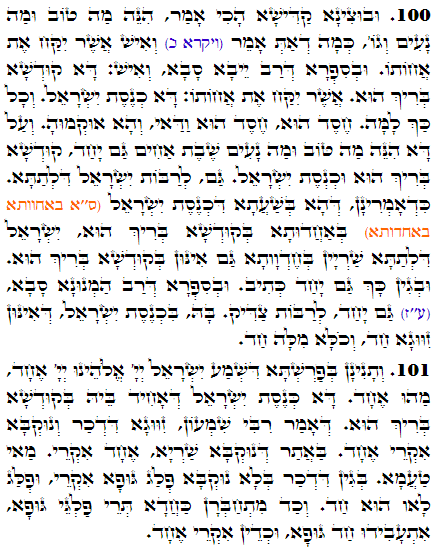Daily Zohar # 3302 – Vayikra – Say to wisdom, “You are my sister”
.
Hebrew translation:
101. וְשָׁנִינוּ בְּפָרָשַׁת שְׁמַע יִשְׂרָאֵל ה’ אֱלֹהֵינוּ ה’ אֶחָד, מַהוּ אֶחָד? זוֹ כְּנֶסֶת יִשְׂרָאֵל שֶׁאֲחוּזָה בַּקָּדוֹשׁ-בָּרוּךְ-הוּא. שֶׁאָמַר רַבִּי שִׁמְעוֹן, זִוּוּג שֶׁל זָכָר וּנְקֵבָה נִקְרָא אֶחָד. בְּמָקוֹם שֶׁהַנְּקֵבָה שׁוֹרָה, אֶחָד נִקְרָא. מָה הַטַּעַם? בִּגְלַל שֶׁזָּכָר בְּלִי נְקֵבָה נִקְרָא חֲצִי גוּף, וַחֲצִי אֵינוֹ אֶחָד. וּכְשֶׁמִּתְחַבְּרִים כְּאֶחָד שְׁנֵי חֲצָאֵי גוּף, נַעֲשִׂים גּוּף אֶחָד, וְאָז נִקְרָא אֶחָד.
.
Zohar Vayikra
#100
Leviticus 20:17
“וְאִישׁ אֲשֶׁר יִקַּח אֶת אֲחֹתוֹ בַּת אָבִיו אוֹ בַת אִמּוֹ וְרָאָה אֶת עֶרְוָתָהּ וְהִיא תִרְאֶה אֶת עֶרְוָתוֹ חֶסֶד הוּא וְנִכְרְתוּ לְעֵינֵי בְּנֵי עַמָּם עֶרְוַת אֲחֹתוֹ גִּלָּה עֲוֹנוֹ יִשָּׂא.”
“‘If a man takes his sister, his father’s daughter or his mother’s daughter, and sees her nakedness and she sees his nakedness, it is a wicked thing. And they shall be cut off in the sight of their people. He has uncovered his sister’s nakedness. He shall bear his guilt.”
‘a man takes his sister’ is explained in the book of Rabbi Yeva Sava as the Holy One Blessed be He, ‘Man’ ‘אִישׁ’, takes his ‘sister’, which is the Shechina in Malchut. When they are together, which is the aspect of ‘brothers dwell together’ that brings Chassadim. Then the Israelites with the Tzadikim unify with the Holy in happiness.
The ‘nakedness’ is an unholy connection and the aspect of judgments.
#101
In the Shema Israel prayer we read “Hear, O Israel: YHVH our God, YHVH is one!”
‘One’ is the state of unification of the Shechina and YHVH. Rabbi Shimon explains that the unification of male and female is called ‘one’. A male without a female is called half a body. When they join together they are called one.
Lesson;
Genesis 1:27
“וַיִּבְרָא אֱלֹהִים אֶת-הָאָדָם בְּצַלְמוֹ, בְּצֶלֶם אֱלֹהִים בָּרָא אֹתוֹ: זָכָר וּנְקֵבָה, בָּרָא אֹתָם”
“God created man in His own image, in the image of God He created him; male and female He created them.”
God created man in his own image, one unit of male and female. The ‘image’ is the image of the Tree of Life, meaning that the created man is like a miniscule version of the same system created for the entire universe.
The Endless Light didn’t have the aspect of separation in his essence so his first creation was one but with two sides, male and female.
They were separated in a different process that was done on the second day, which was the day of separation and the creation of the Left Column.
Genesis 2:18
“וַיֹּאמֶר יְהוָה אֱלֹהִים, לֹא-טוֹב הֱיוֹת הָאָדָם לְבַדּוֹ; אֶעֱשֶׂה-לּוֹ עֵזֶר, כְּנֶגְדּוֹ”
“Then YHVH God said, “It is not good for the man to be alone; I will make him a helper against him.””
When Adam was created Eve was attached to him back to back. God ‘made Adam a helper against him (in front of him)’, meaning he separated the female from his back and brought her in front of him. Now they can have unification and restore the ‘oneness’ state they had before.
That is why we have the desire to call someone ‘My Wife’ and ‘My Husband’. We are halves until unified with our other half.
This aspect is painful to many that may still feel a separated ‘half’ in a relationship. We are at the end of the Tikun and the key is to do our best with what we have, in the state that we are in.
The Torah studies complete us
Proverbs 7:4
“אֱמֹר לַחָכְמָה אֲחֹתִי אָתְּ וּמֹדָע לַבִּינָה תִקְרָא.”
“Say to wisdom (Chokmah), “You are my sister,” And call understanding (Binah) your nearest kin,”
{||}

 Previous: Vayikra
Previous: Vayikra

